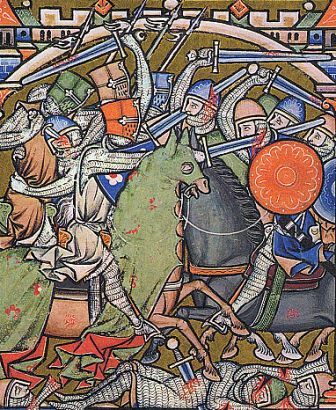I know this is straying off topic but how exaggerated do you think the cleaving through helm, coif, and skull is? In Usamah ibn-Munqidh's first hand account of the crusades he tells of several instances where swords had cleaved a man in half or hacked him from his shoulder down to his saddle. I realize a mail shirt and bone isn't as tough as a helm, bone, and mail but isn't it plausible that a sword could do that, maybe not as frequently as the Maciejowski Bible but do you think it happened occasionally? Escpecially a nice falchion? Just wondering how far a sword really could cleave.
I figured I'd bite at Chad's hint about a new thread concerning J. Bedell's post. I also think it would be interesting to get everyone else's take on this. I'm sure most of us have seen test cutting (if not in person, then though the web) showing a modern sword cleaving through mail (usually butted) and leaving a cut on a pork shoulder or some other medium. It's something else entirely to look through the Maciejowski Bible and see image after image of armored heads seemingly cleaved to the jawline, etc. So what does everybody else think? Is there an overabundance of artistic license from period art? Or what it really commonplace to see torsos and skulls cleaved through so casually?
